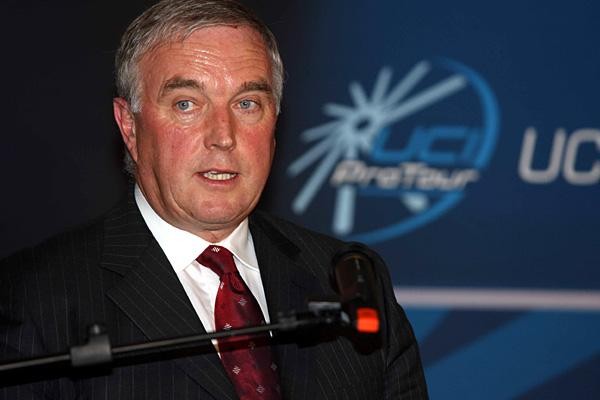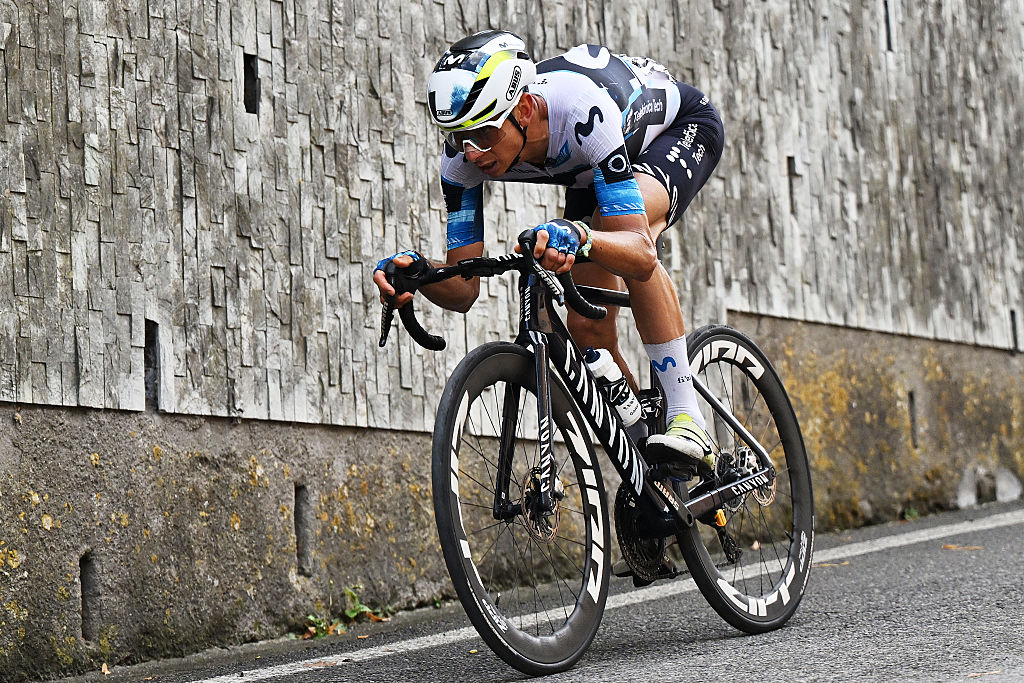Vroomen and Ashenden criticise lack of biological passport testing
UCI responds with stinging press release

The strength of the UCI’s biological passport has been criticised after a former team manager Gerard Vroomen and Michael Ashenden - a member of the UCI’s passport panel, both raised issues about the programme's testing frequency and management.
Vroomen oversaw the Cervelo TestTeam from 2009 to 2010 and was part of Garmin-Cervelo’s initial set up. He no longer works as part of the team but has first hand experience of how professional cycling works and understands its problems. On Wednesday he wrote a blog on his personal website in which he raised issue with the frequency of passport testing, saying that he had not heard of a rider receiving a biological passport test ‘between the end of the 2010 Tour and April 2011.’
He suggested, without any categorical proof, that this may have been due to the high legal costs incurred because of the UCI’s disputes with cases against the likes of Franco Pellizotti. A case which the UCI eventually won at the Court of Arbitration for Sport.
The UCI told Cyclingnews on Wednesday that passport testing occurred at the Vuelta, Worlds and a Leopard Trek training camp.
On Thursday the UCI also issued a stinging press release claiming that 1074 blood passport tests were done in 2010, with a further 1577 done so far this year. The UCI said this includes out-of-competition controls, pre-competition and in-competition controls on all major events during this period and team training camps.
The UCI criticised Vroomen's assertions as "misleading, irresponsible, mischievous and clearly show a very weak understanding of this complex subject, an area which goes well beyond financial questions alone."
However while Vroomen’s opinion can be questioned because he no longer works in an area that would allow him to see such data - at least officially, the views of Ashenden are perhaps more serious.
The latest race content, interviews, features, reviews and expert buying guides, direct to your inbox!
He is regarded as one of the world’s leading anti-doping experts and is a member of the UCI’s panel that analyses anonymous blood profiles. His experience backs up Vroomen’s claims regarding gaps in testing.
“It’s correct that the observation made by Gerard Vroomen matches with my experience. I have noticed a significant gap between tests in some of the profiles I have reviewed. It’s definitely not in every single profile, but enough to have left an impression on me,” he told Cyclingnews.
“What I can’t answer is why those gaps are present. Perhaps the UCI are pursuing a targeting strategy that I’m not aware of, but leaving big gaps doesn’t make any sense to me.”
Like Vroomen, Ashenden raised the issue over funding. The 18 ProTeams currently pay 120,000 Euros to be part of the testing pool. While there is no set guidelines on how many tests each rider or team should face, a lengthy gap is still a concern. Ashenden is tasked with only analyzing data given him to the UCI that they feel could be threatening to the sport’s credibility. If he is given data that has potentially missing data his task becomes harder.
“I don’t know whether it’s a funding issue. But obviously it’s true that the passport cases that have been prosecuted so far took an enormous amount of time and energy and money. I don’t pretend to be Nostradamus, but at the Play the Game conference in 2007 I did flag the possibility that legal costs could prove a major obstacle if we ever introduced a passport that actually caught a lot of athletes.”
“Using a hypothetical example, if 10% of 800 riders are doping and you introduce a test that catches all of them, you are going to be confronted with a legal bill for 80 doping cases in your first year. Common sense tells you that this is untenable for any federation to absorb. I’m still not sure if the anti-doping world have gotten their heads around that problem yet.”
In defence of the biological passport
Despite his doubts, Ashenden was quick to praise the UCI for implementing the biological passport. In 2008 when it was first introduced and in 2009 when the first cases were announced by Anne Gripper, the programme lacked the support of even WADA. Since then a number of other international sports federations have spoken about their admiration for the programme.
Last week Gripper told Cyclingnews that more national and sporting federations should begin correlated and collecting data as soon as possible. FINA, the international governing body for swimming announced last month they would introduce a passport programme.
But while Ashenden does credit the UCI for having the moral fiber to push through the passport he, like Gripper last week, acknowledged that no new cases had been opened since Gripper left the organization in the spring of last year.
“I think the UCI deserve credit, since they jumped into this without knowing what their legal costs would be. But if it turns out that the legal costs are so large that it’s affected how many blood tests they can collect, then we have to find a solution, and quickly,” Ashenden told Cyclingnews.
One area that Ashenden failed to agree with Vroomen over was the athletes’ rights.
“I don’t follow Gerard Vroomen’s argument that costs would be minimised by enhancing the rider’s rights," he said. "I just don’t see how one leads to the other. But he is plain wrong suggesting athletes don’t get access to all data, since every athlete is given every blood test result upon which the decision was made.”
“I would also dispute his assertion that independent testing programs somehow gave better monitoring than the UCI’s Passport. I felt reassured when previous team-based programs automatically shared their results with WADA, but now teams keep their results in-house and pay consultants to decide what is suspicious. I think there is a credibility gap there. After all, if we argue that a sport isn’t in a position to police itself, how can we possibly argue that one of its team would effectively police themselves?”
UCI respond
Cyclingnews contacted UCI President Pat McQuaid and asked him about the alleged gap between tests in the passport and the fact that no new cases had been opened.
“I couldn’t tell you why. That’s anti-doping and anti-doping does its own work and I’m not kept abreast of where they are on when cases are opened," he said told Cyclingnews.
"I don’t want to discuss the passport and how it works, that’s anti-doping and they do that and not me. We could be ready to open a case tomorrow but wouldn’t know until such time.”
“The passport has proven itself in legal terms and it stands up,” McQuaid concluded.
Cyclingnews then attempted to contact Gripper’s replacement Francesca Rossi.
We were told that she was in meetings all day but a UCI spokesman did call Cyclingnews back. He told us that Rossi would not be talking to the press but did confirm that passport tests had been carried out at the Vuelta, Worlds and the Leopard training camp.
On Thursday lunchtime the UCI made their more detailed statement, criticising Gerard Vroomen for his comments and revealing that his former Cervelo team was tested 45 times between last year's Tour de France and the end of the year. The UCI also revealed that the Garmin-Cervelo team has been tested 68 times between last year's Tour de France and the end of April this year.
"The UCI has decided to provide the following statement in order to protect the public image of cycling and in particular with due respect to the commitment of those working on daily basis in the fight against doping," the statement reads.
"The allegation that no tests were carried out under the biological passport testing program between the end of the Tour de France 2010 and April 2011 is absolutely incorrect, as the statistics clearly demonstrate."
"The UCI considers Mr Vroomen’s comments particularly unacceptable given the years of research and investments in this area. The result of UCI’s anti-doping work has been unanimously recognized by international experts and its program has become a worldwide reference in the fight against doping."
"The UCI highlights the exceptional quality of competition at the recent Tour de France 2011, a Tour which also reflected a cleaner era in cycling. Mr Vroomen appears exceptionally poorly informed as he would seem not to have been aware of the tests carried out on the two teams he has been involved with. A simple phone call could have clarified the situation for Mr Vrooman should his concerns have been genuine, but he chose not to do this."
"Further the UCI refutes any suggestion that anti-doping funds have been used to fund legal bills for fighting legal cases.The UCI therefore suggests that Mr Vroomen, and the media, ensure that facts are correct before making public statements about UCI’s activities."
Daniel Benson was the Editor in Chief at Cyclingnews.com between 2008 and 2022. Based in the UK, he joined the Cyclingnews team in 2008 as the site's first UK-based Managing Editor. In that time, he reported on over a dozen editions of the Tour de France, several World Championships, the Tour Down Under, Spring Classics, and the London 2012 Olympic Games. With the help of the excellent editorial team, he ran the coverage on Cyclingnews and has interviewed leading figures in the sport including UCI Presidents and Tour de France winners.

